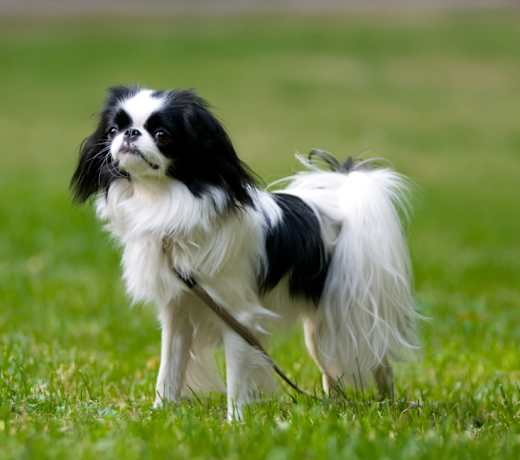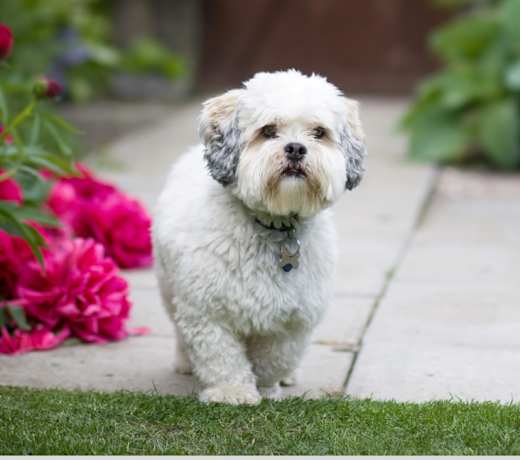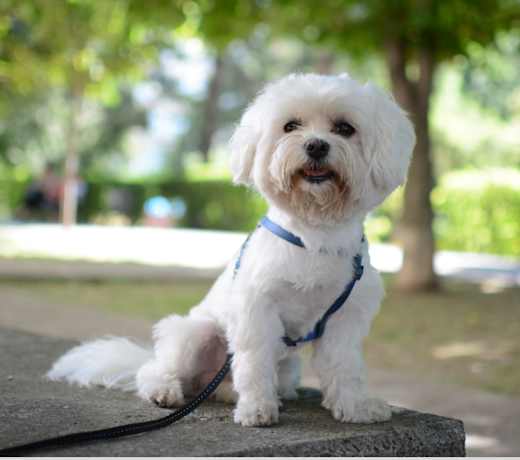Yorkies are small dogs with a long, fine, and silky coat that is typically black and tan. Their coat is parted down the middle of the back and falls symmetrically on either side. Yorkies have a flat skull with a moderately short muzzle. Their ears are small and V-shaped, standing erect on the head.
Yorkie
Breed Type: Toy
Common nicknames: Yorkie
Coat: Silky
Hypoallergenic: Yes, they may not trigger allergies.
Temperament: Lively, affectionate, stubborn, independent
Life expectancy: 11-15 years
Color & patterns:
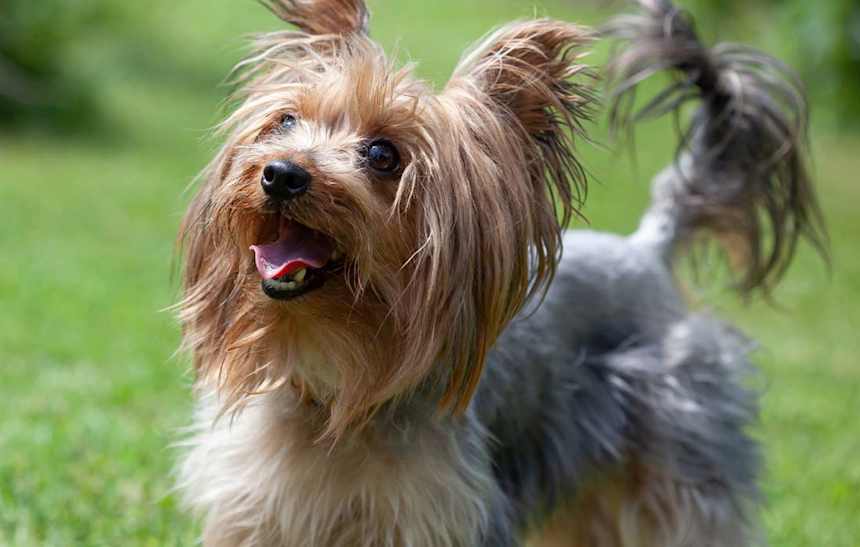
If you’re looking for a whole lot of cute and charm, the Yorkshire Terrier, (or “Yorkie” for short) is a great option. These little balls of fluff are tiny in size — they typically weigh around four to seven pounds and stand about seven to eight inches tall at the shoulder — but big in personality. These dogs are fierce and feisty. They’re also incredibly intelligent and easily trainable, making them perfect companions for all types of pet parents. Plus, with their luxurious long coats and adorable button noses, they’re hard to resist.
Yorkie characteristics
Learn about about Yorkie basics like their fur colors, shedding levels, how much grooming they need, and other Yorkie facts.
Average height
7-8 inches (17.8-20.3cm)
Average weight
2-10 pounds (0.9-4.5 kg)
Average lifespan
11-15 years
Exercise needs
Grooming needs
Full-grown size
Good with cats
Good with kids
Training Aptitude
When are Yorkies full grown?
Yorkies typically reach their full-grown size and weight by the time they are around a year old. Like many small dog breeds, Yorkies tend to mature relatively quickly compared to larger breeds due to their genetics. While they might physically reach their full size within the first year or so of their life, their behavior, temperament, and sometimes even coat development can continue to evolve as they reach the 18-month mark.
It’s important to provide proper nutrition, exercise, and healthcare during their growth stages to ensure they develop into healthy adult dogs. Regular veterinary check-ups can also help monitor their growth and overall well-being.
How big do Yorkies get?
Adult Yorkies typically stand around 7 to 9 inches in height at the shoulder and usually weigh between four to seven pounds. Yorkies are small-sized dogs; the breed is often classified as a toy breed.
What colors do Yorkies come in?
Yorkies come in four colors — Black, Blue, Tan, and Gold — but all Yorkshire Terrier puppies are born black and tan. As Yorkies age, their coats change to gold and blue (not actually “blue” — it reads as a diluted black color). It takes one to three years for the colors to change, but this blue coloring is the marker of a purebred Yorkshire Terrier. This means older dogs are lighter-colored, losing their black coloring and becoming more gold and tan-colored as they age.
Do Yorkies shed?
Yes, Yorkies shed, but their shedding is minimal compared to many other dog breeds. Yorkies have a fine and silky coat that produces less loose hair compared to breeds with denser undercoats. Their shedding is often less noticeable, especially if their coat is well-maintained through regular grooming. In fact, Yorkshire terriers are a very low-shedding breed.
How long do Yorkies live?
Yorkies typically have a lifespan of around 13 to 16 years. However, individual lifespans can vary based on factors such as genetics, diet, exercise, healthcare, and overall lifestyle. Providing proper care, regular veterinary check-ups, a balanced diet, and maintaining a healthy weight can contribute to helping the Yorkie live a long and healthy life.
How many types of Yorkies are there?
Yorkshire Terriers come in over seven types, including Teacup (extra small), Mismarked (atypical color patterns), Designer (mixed breeds), Solid Black (uncommon), and Parti (tri-colored) Yorkies. The American Kennel Club, however, only recognizes one breed of Yorkshire Terrier. Biewer Terriers are a new official breed that recently emerged as a variation from the parti-colored Yorkie.
Yorkie health
Learn about about the Yorkie health outlook and what diseases they may be prone to at various stages of their life.
Why do Yorkies sleep so much?
Yorkies sleep a lot primarily because they are a toy breed, and tiny dogs have longer sleeping patterns than medium- or large-sized dogs. (Giant breeds, however, have sleep schedules closer to toy and miniature-sized pups.) It’s common for these little dogs to sleep for around 16 hours per day. Originally bred to hunt rats, Yorkies can be higher energy and are more likely to sleep in short, frequent bursts throughout the day rather than for long periods of snoozing.
Are Yorkies hypoallergenic?
Yes, Yorkies are considered a hypoallergenic dog breed. While no dog breed is completely hypoallergenic, their fine and silky coat sheds less, which can help reduce the amount of hair and dander in the environment.
It’s important to note that allergens are not only present in a dog’s hair but also in their skin cells, saliva, and urine. Even hypoallergenic breeds can trigger allergic reactions in sensitive individuals.
Regular grooming practices such as brushing and bathing can help reduce allergens on a dog’s coat and skin. Spending time around Yorkies before bringing one into your home is recommended to gauge the potential for allergic reactions.
Do you need to groom a Yorkie?
Yes, Yorkies should be lightly brushed two to three times a week. Their long, silky coats require regular maintenance to stay healthy and free from tangles and mats.
Yorkies’ long coats can touch the ground and gather debris, so occasional trimming around the paws and the underside can help keep them clean. Some pet parents maintain a shorter “puppy cut” for easier maintenance.
Don’t forget about ears, nails, and teeth. Yorkies can be prone to dental issues, so regular teeth brushing or dental treats can help maintain their oral health.
What do Yorkies usually die from?
Older Yorkies commonly die from heart failure. Other health issues that affect Yorkies include bronchitis, cataracts, keratitis sicca, portosystemic shunt, and lymphangiectasia. Their diminutive size also makes them susceptible to general injury and a poor tolerance for anesthesia.
What diseases are Yorkies prone to?
Yorkies are prone to a few diseases, including:
Portosystemic Shunt: Portosystemic shunt (PSS) is a hereditary issue that obstructs proper blood flow to the liver. Since the liver is responsible for detoxifying the body, PSS sends the toxins in unfiltered blood to the heart, brain, and other body parts. Signs can include but are not limited to behavioral changes, loss of appetite, hypoglycemia (low blood sugar), jaundice, urinary tract problems, vision problems, and stunted growth. PSS can be life-threatening if not treated early. Antibiotics and diet changes can help in the short term, but surgery is the only permanent treatment for the problem.
Legg-Calve-Perthes: This condition causes the head of the femur (located in a dog’s hind leg) to spontaneously degenerate. Over time, this will lead to erosion of the hip joint and arthritis. A Yorkie suffering from Legg-Calve-Perthes will become lame, limp while walking, and experience pain when moving the hip joint. Surgery is the most effective treatment for the disorder.
Progressive Retinal Atrophy: Progressive retinal atrophy (PRA) is a group of genetic diseases that affect the retina. They are progressive degenerative diseases and will eventually cause blindness in both eyes. There is no effective treatment to stop PRA.
Yorkie history
Learn about where the Yorkie came from.
What were Yorkies bred for?
Yorkies were bred for ratting (catching rats and mice) in clothing mills and mines in the 19th century. Their compact size, keen senses, and fearless nature made them effective rat hunters, helping to protect stored materials and products from damage.
Over time, as the demand for rat-catching decreased and Yorkies’ charming appearance and engaging personalities became more recognized, they transitioned from working dogs to companion animals.
Where are Yorkies from?
Yorkies originate from the county of Yorkshire in England. These small terriers are the descendants of Black and Tan Terriers from Scotland, who were brought with workers in the mid-1800s to catch rats and mice in clothing mills and mines. Over time, their charming appearance and lively personalities led to their popularity as companion dogs among the Victorian elite.
Yorkie temperament
Learn about about the Yorkie temperament and how well they fit into your lifestyle, home environment, and family.
Are Yorkies good with kids?
Yes, Yorkies can be good with children, but due to their small size, kids need to be taught to handle them gently and avoid rough play. Yorkies are terriers, so despite their adorable, tiny exterior (of which they are totally unaware), their stubborn temperament can sometimes make them a little defensive towards the rough manner in which young kids may handle dogs.
As with any breed, it is recommended that your child is always supervised when interacting with your Yorkshire Terrier to keep both the child and dog safe. Pet parents also need to provide their Yorkies with proper socialization and training to behave well around children.
Are Yorkies good family dogs?
Yes, Yorkies can be good family dogs, especially in homes with older, gentle children who understand their small size. Proper socialization, training, and supervision are essential — teaching children how to properly treat dogs is crucial to ensure positive experiences for both the dog and the child, as is teaching dogs how to interact gently with children.
Yorkies' lively personalities, small size, and affectionate natures can make them loving companions for families willing to provide care, exercise, and grooming.
Are Yorkies easy to train?
Yorkies are moderately easy to train. Terriers tend to have a stubborn, independent streak, so you might find that some Yorkies refuse to go out in the rain because they don't like getting their feet wet.
However, training any dog takes substantial time and effort, regardless of breed, and a dog’s temperament has an enormous amount to do with their training. If you're willing to put in the work, Yorkies' above-average intelligence is waiting for the lesson — most Yorkshire Terriers can be housetrained in a matter of weeks.
Do Yorkies bark a lot?
Yes, Yorkies are known to bark a lot. Their alert and vigilant nature make them effective watchdogs, and they often use their voice to alert their pet parents to any changes or unfamiliar sounds in their environment.
Training and proper socialization can play a significant role in managing a Yorkie’s barking tendencies. Providing them with mental and physical stimulation can also help reduce boredom-related barking.
Can a Yorkie be a service dog?
Yes, Yorkies can potentially become service dogs if they have the right temperament, training, and physical capabilities for the tasks required. Their small size might limit the types of tasks they can perform, but with proper training and consideration of individual needs, they can excel in assisting individuals with certain disabilities.
Are Yorkies good dogs?
Yes, Yorkies are considered good dogs. Yorkies often form strong bonds with their pet parents and enjoy being close companions. Despite their small size, Yorkies have a lively and spirited personality that brings energy and entertainment to a household.
Are Yorkies smart?
Yes, Yorkies are considered to be smart dogs. They have a reputation for being quick learners, and their intelligence, combined with their lively and alert nature, makes them responsive to training and interaction. Training, positive reinforcement, and mental stimulation are all factors that can enhance a Yorkie’s cognitive abilities and engagement.
Are Yorkies good with cats?
Yes, most Yorkies get along with cats if introduced early, and both pets have compatible temperaments. While Yorkies are considered a cat-friendly breed, your Yorkie’s individual temperament, early socialization, and training play a big role in determining if they will be friendly to other animals.
Despite their rat-catching ancestry, Yorkies do not have a strong instinct to chase cats. You’ll want to assess how well your cat behaves with toy dogs as well to make sure there won’t be any issues from either side.
Popular Yorkie mixes
Some common Yorkie mixes include:
Yoranian (Yorkshire Terrier + Pomeranian)
Yorkipoo (Yorkshire Terrier + Miniature Poodle)
Chorkie (Yorkshire Terrier + Chihuahua)
Yorkichon (Yorkshire Terrier + Bichon Frise)
Morkie (Yorkshire Terrier + Maltese)
Shorkie (Yorkshire Terrier + Shih Tzu)
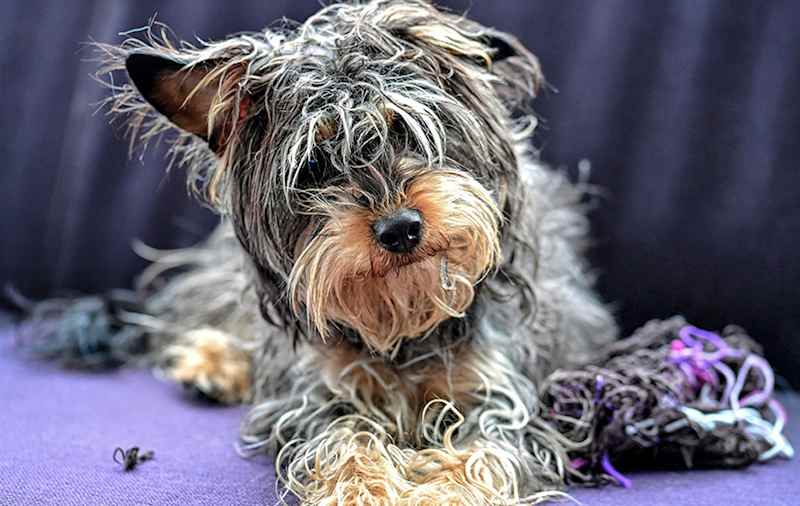
Find Yorkie puppies near you
Adopting a Yorkie
Learn about acquiring a Yorkie - the pros and cons of adopting versus going through a breeder, and associated costs.

Slushy
Yorkie, Yorkshire Terrier
Male, 8 mos
Los Angeles, CA
Good with dogs
House-trained
Spayed or Neutered
Shots are up-to-date
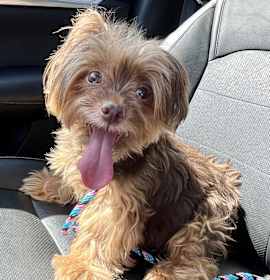
Twinky
Yorkie, Yorkshire Terrier
Male, 14 yrs 4 mos
Los Angeles, CA
Good with cats
House-trained
Spayed or Neutered
Shots are up-to-date

Lulu
Yorkie, Yorkshire Terrier Maltese
Female, 8 yrs 1 mo
Los Angeles, CA
House-trained
Spayed or Neutered
Shots are up-to-date

Romeo
Yorkie, Yorkshire Terrier Cairn Terrier
Male, 3 yrs 3 mos
Santa Monica, CA
Good with dogs
Good with cats
House-trained
Spayed or Neutered
Shots are up-to-date

SPARTACUS
Yorkie, Yorkshire Terrier
Male, adult
Los Angeles, CA
Good with dogs
Good with cats
Needs special attention
Needs experienced adopter
House-trained
Spayed or Neutered
Shots are up-to-date
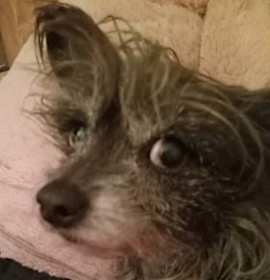
BIRDIE-Sponsorship needed
Yorkie, Yorkshire Terrier Chinese Crested
Female, 14 yrs 5 mos
Los Angeles, CA
Needs special attention
House-trained
Spayed or Neutered
Shots are up-to-date

Cherry
Yorkie, Yorkshire Terrier
Female, 8 yrs
Encino, CA
Spayed or Neutered
Shots are up-to-date

Mimi
Yorkie, Yorkshire Terrier
Female, 7 yrs
Encino, CA
Spayed or Neutered
Shots are up-to-date

Slushy
Yorkie, Yorkshire Terrier
Male, 8 mos
Los Angeles, CA
Good with dogs
House-trained
Spayed or Neutered
Shots are up-to-date

Twinky
Yorkie, Yorkshire Terrier
Male, 14 yrs 4 mos
Los Angeles, CA
Good with cats
House-trained
Spayed or Neutered
Shots are up-to-date

Lulu
Yorkie, Yorkshire Terrier Maltese
Female, 8 yrs 1 mo
Los Angeles, CA
House-trained
Spayed or Neutered
Shots are up-to-date

Romeo
Yorkie, Yorkshire Terrier Cairn Terrier
Male, 3 yrs 3 mos
Santa Monica, CA
Good with dogs
Good with cats
House-trained
Spayed or Neutered
Shots are up-to-date

SPARTACUS
Yorkie, Yorkshire Terrier
Male, adult
Los Angeles, CA
Good with dogs
Good with cats
Needs special attention
Needs experienced adopter
House-trained
Spayed or Neutered
Shots are up-to-date

BIRDIE-Sponsorship needed
Yorkie, Yorkshire Terrier Chinese Crested
Female, 14 yrs 5 mos
Los Angeles, CA
Needs special attention
House-trained
Spayed or Neutered
Shots are up-to-date

